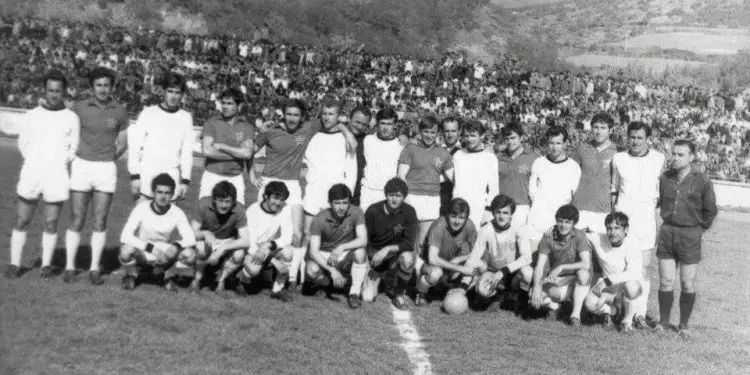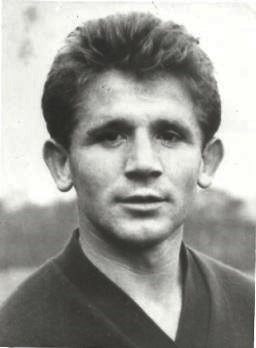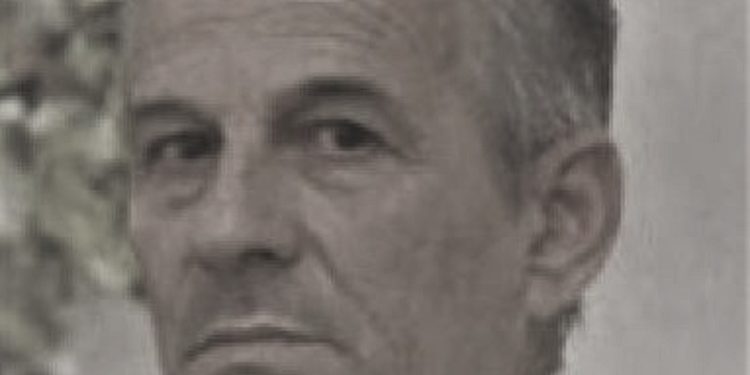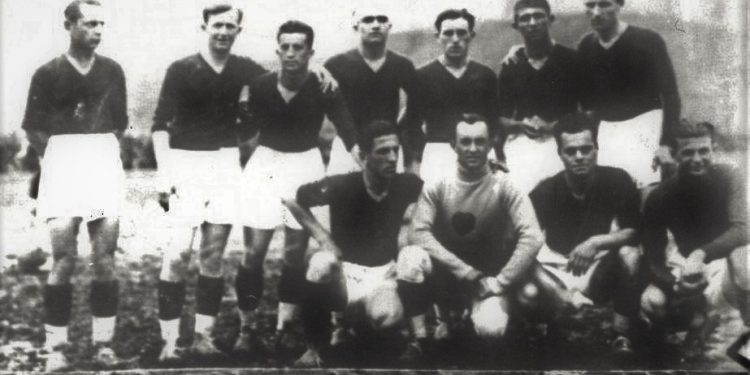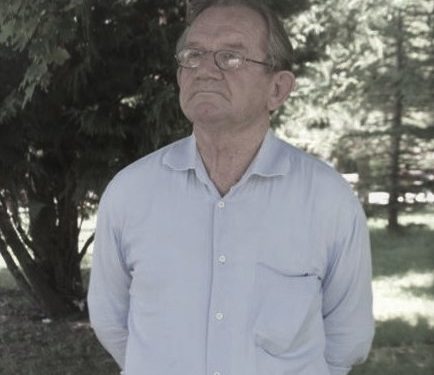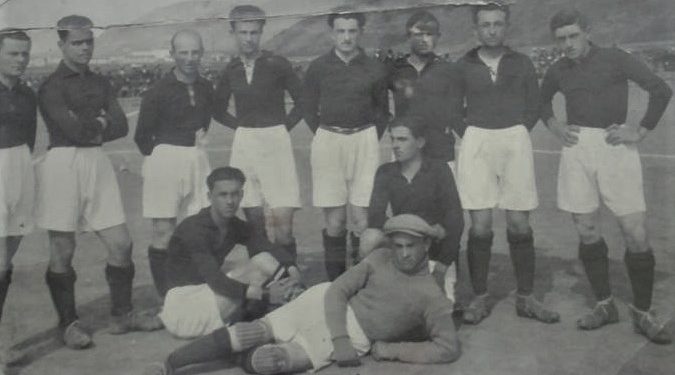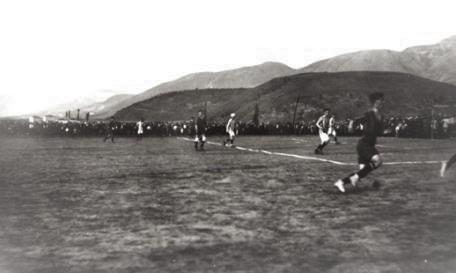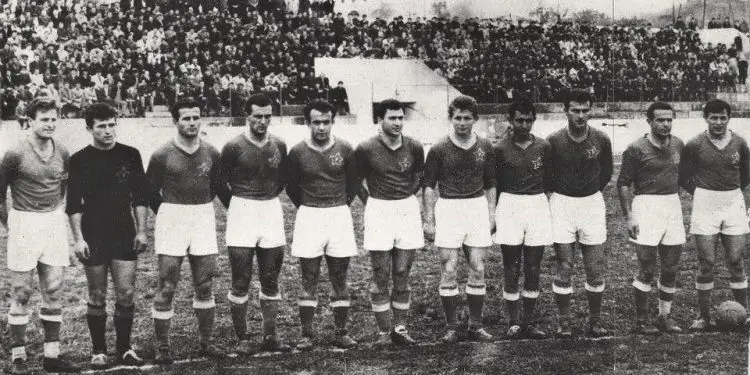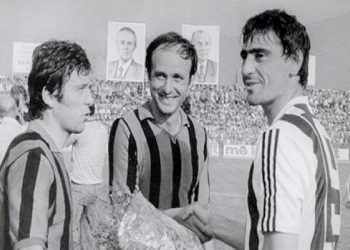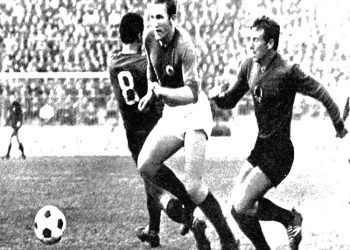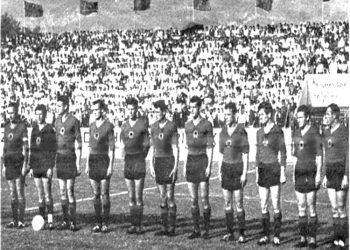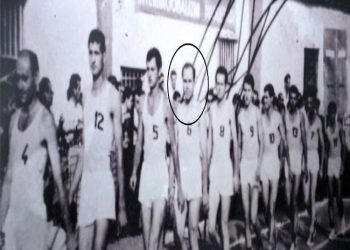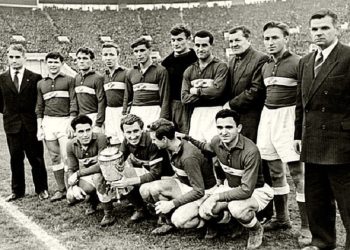From Vepror Hasani
The fifth part
Memorie.al / We had let him meet in one of the bars in Korça. I saw that he was coming with his “Cadillac”, (that’s what he called the bike), which he goes out with every day…! After we ordered, “Honored Master of Sports”, Teodor Vaso, decorated with the ‘Gold Medal’ – for outstanding merit in sports -, football player from 1957-1973 and coach from 1973 until today, started to tell me. Recounted one of his football stories: “Everything about my stay in the ‘Partizani’ team or not, was left in the hands of the generals…” he began to tell me.
Continues from last issue
The confession of the “Merited Master of Sports”, the football legend, Teodor Vaso
“The news in the Ministry of Defense had fallen like a bomb…”! Perhaps they had not expected such news. Immediately after receiving the notification, the Minister of People’s Defense and several senior officers were set in motion. A solution was required. The draw had just been made by UEFA. The “Partizani” team would play against the West German team of Cologne. In addition, the first match would be played in Tirana. They would come here, to Albania, to its capital. Could Albania present itself as a dignified country?! The question hung over everyone’s head. Disquiet among the majors and generals had begun to grow.
The news had also reached the Political Bureau. Everything was clear: neither the presentation of Albania in front of the Germans, nor the game with the Cologne team would be easy. In 1954, the Federal Republic of Germany was declared world champion in Switzerland. This fact made the arrival of the Germans in Tirana even more frightening. Until then, our teams had played only with Eastern teams. The matches that took place were between the military teams of the Socialist Camp in Leipzig and Hanoi. Even the youth of the Albanian National Team had not had the luck to play with the Westerners.
In 1955 they played in Warsaw, in 1957 in Moscow, while again in 1957 and 1958; they played in Tirana, but with the East Germans. In fact, in 1962, Partizan faced European football clubs for the first time, with Sweden’s Norçöping for the cup of champion teams, but surprisingly, the arrival of Cologne had disturbed the dome of the state. He lost the match with “Norceping” in Sweden 2-0 and drew 1-1 in Tirana.
In the second meeting of the row, the draw drew closer to “Partizan”, “Spartak” of Plovdiv. We went to Bulgaria with a 1-0 victory in the first match. “Partizani” activated the formation in Bulgaria: Mikel Janku, Fatbardh Deliallisi, Miço Papadhopuli, Fatmir Frashëri, Teodor Vaso, Lin Shllaku, Kolec Kraja, Osman Mema, Panajot Pano, Refik Resmja and Robert Jashari. It was already 1964; “Partizani” was going to play with one of the teams of the Federal Republic of Germany. They were coming…”!
The worry…!
“The concern was growing. All efforts were being made for the West Germans to get to know the best sides of Albania. The concern that had gripped the dome of the state went down to the leaders of the team, included the players, even everything, even the premises where the athletes moved. The buildings of the “Partizani” Sports Club were all one-story: the dormitory, the canteen, the leisure club and the warehouses. I don’t know why that day these buildings began to look different to me. Next were the showers and after the showers followed the tennis, volleyball and basketball courts. On the south side there was a small pool on a ledge.
I never saw water there. Even on the day the news came, the pool was not filled with water. The game hall had carom billiards in the middle where all the soldiers from Korcar, Shkodra, Tirana, etc. played. On the side were 4-5 small tables with chairs across the hall. In the middle of the ward’s territory stood out the abandoned fountain. The building and the fountain were said to have been built by Italian craftsmen during the period of the country’s occupation, but now they were no longer what they had been.
The courtyard of the Club’s territory by the national road Tirana – Durres (next to the Sports Palace “Partizani” today “Asllan Rusi”), was built with simple brick mosaics. The end of the wall coincided with the Aviation Department of Tirana. The impression was created as if even these brick buildings and mosaics had heard the news and was somewhat shy! Entrances and exits to this territory began to become more frequent. An extraordinary meeting was expected. As always, the arrival of major officers was also expected.
At that moment, I remembered the path that the “Partizant” team had traveled until then. “Partizani” had taken the first step in 1947, with 6 players of “17 November”: Bule Vathi, Xhavit Demner, Besim Fagun, Halit Sakiq, T. Baç and Zyber Lis. “Vllaznia”, champions of the years 1945-’46, received the following players: Pal Mirashi, Loro Boriçin, Xhevdet Shaqiri, Alfred Bonati, Besim Dibra and Isuf Pelingu. He withdrew again from “17 November” the players: Parapani, Rexhep Spahiu, Vasil Biçak and Slave Llambi, from “Besa” he took Zihni Gjinal and Sul Maliqati and later from Pogradec, he took Miço Ndin.
From this glorious constellation, I found in the “Partizan” team Sul Maliqati, Refik Resmen, Miço Ndinin, Gani Merjen, Kolec Krajë, as well as footballers Fatbardh Deliallisi, Robert Jashari, Miço Papadhopulli, who started playing in the middle of the decade of the 50s. I had come from Korça as a soldier in department 3700 in Tirana at the end of 1963. A week later I would find myself in the territory of the “Partizani” Sports Club. With the “Skënderbeu” team, I had played for 3 years in a row as a central defender and in a championship, due to emergency reasons; I held the role of a midfielder”.
Urgent meeting at the “Partizani” Sports Club
“It happened as expected. The major officers and generals had arrived. The meetings with the soldiers in the “Partizan” team were held in the culture hall. The billiard table that was at the top of the space was used as a podium. Major General Thoma Xixho had taken a seat in the middle. The head of the Sports Club was sitting on one side of him, while on the other, Coach Loro Boriçi. Sitting close to the podium next to each other, shoulder to shoulder, were: Refik Resmja, Kolec Kraja, Miço Papadhopuli, Fatbardh Deliallisi and the second coach Rexhep Spahiu. Behind them, two officer players Mikel Janku and Tomorr Shehu, they had Fatmir Frashëri, Robert Jashar, Panajot Panon and some reserve players.
The first word was expected. In front of the podium, in addition to the football team, there were civilians, club employees, major officers and soldiers. The presence of some generals, who were sitting next to some old players of “Partizani”, was also noticeable. The presence of many officers with large stars and gilded epaulettes sent a slight nervous tension through the environment. It was the first time this happened. The entrance to the assembly hall faced east. The door was two-story, high and heavy. The facade gives the idea of a warehouse, maybe it was like that when it was built. Upstairs, in front of the entrance, the picture of the Commander (Enver Hoxha) cast a sad glance.
Apart from the small cherry-colored tiles of the grounds, beautifully arranged, nothing else attracted the attention. The hall was bare, it had an empty look. A quote written long ago had been whitewashed, but some letters were still visible. The forgotten slogan was more ugly than beautiful. After the usual introduction, with which the meetings began, the news was given: “The West Germans will come to Tirana to play with the ‘Partizan’ team.” Among the athletes, there was a shudder, but what was more, it was a kind of pride mixed with a sense of responsibility.
They would have the chance to compete with one of the best teams in Western Europe. This also brought some anxiety. The general said that Albania needed victory. Gani Merja, sitting in front of me, was saying something to a general who was sitting next to him. Team managers and footballers had to have their say. They were told it would become impossible. A major officer closed the meeting with these words: “We have also fought with the Germans, but even though they were more numerous than us, we won again. (He was talking about the time of the war). You also have to win: you are 11 Albanians against 11 Germans”.
Anxiety…!
“The senior officers left the meeting, but it really seemed like they took some kind of anxiety with them. They were not sure if Albania would be able to face the West Germans. The football season of “Partizan”, 1962-’63 had not been so good and they knew it. “Partizani” had lost 2-0 with “Norçeping” in Sweden, with this result the match with “CSKA” of Moscow in Hanoi ended.
“Partizani” suffered another 3-1 defeat against “Spartak” of Plovdiv. However, he had lost two matches against champion teams, but he would now be facing a football team with a greater and more intimidating capacity, compared to all the football teams that “Partizani” had played since the day of its creation!
The defeat of our representative in Hungary in 1950, with the result 12-0, was still not forgotten, just as its players were not forgotten either: Ferens Pushkash, Koçis, Cibor, Bozhik Grosiç, etc. Already the heavy shadow of German football was frightening everywhere. For this reason, it was expected that there would be changes in the formation of the “Partizan” team. Someone would leave the team and someone else would take his place. This concern also spread among the athletes. The three attackers: P. Pano, R. Jashari and K. Kraja, were irreplaceable. The first two were declared the best scorers of the championships of 1961 and 1962-’63, while R. Jashari for the year 1963-’64.
No movement could be made in the attack of the team. The vexing issue was how to make the most effective defense possible. The last echelon of the military team’s defense consisted of Sul Maliqati Mikel Janku, (goalkeeper); Fatbardh Deliallisi and Fatmir Frashëri, fullbacks, and Lin Shllaku, a midfielder close to the defense, all three were starters for the National team. Mico Papadhopuli played center-back. Mikel Janku, together with the three starters of the National Team, having Skënder Halili of “17 November” in the middle of the defense, made up a major five of the defense of the Representative team.
However, the fear and dilemma of sports competition stemmed from the past. The squad we presented, in which Papadhopuli had partially played until the eve of the match with Cologne, suffered two defeats with the Bulgarian “Olympics”, 1-0 in 1963 and 4-0, with Denmark, again in 1963, and 2-0 with the Netherlands in 1964. They got these results with the Albanian National Team, while they lost with “Norçeping”, “Spartak” of Plovdiv and “CSKA” of Moscow in Hanoi”.
“Partizan” headquarters
“Major Officers of the Ministry of Defense were making their visits more and more frequent to the Partizan club. They wanted to know who would be the 11 athletes who would play with Cologne. From time to time, generals and major officers appeared in the territory of the “Partizani” Club: Petrit Dume, Beqir Balluku, Rahman Përllaku, Sejdin Avdia, Muharrem Kokomani, Et’hem Gjinushi, Thoma Xhixho, Qazim Kapisizi, Vaskë Gjino, Todi Naço, Sadik Bekteshi, etc. The headquarters of the “Partizan” team had three football strategists: Loro Boriçin, Rexhep Spahiu and Besim Fagun, where of course Boriçi was the first violin.
For this reason, he had absolute powers, which made him to be as little influenced as possible in the formation of the team, but “Partizani” as well as “Dinamo”, being a military team, had a different institutional and moral code. . Every time “Partizani” played with international teams, the dome of the departments together with the relevant ministers was there. The opinion of major officers was also present in the decision-making of the Headquarters. That was how it had always happened. The “Partizan” team had been constantly in motion and occasional changes.
During the first years of the decade 1960-70, the red team began to refresh the famous contingent. The players: S. Deda, R. Haxhiu and then Refik Resmja, Kolec Kraja, Sul Maliqati and Gani Merja, gave way to the younger ones. The first of the young players to start for Partizan was Mejit Haxhiu from Vlonia, Petraq Sinjari appeared on the attack from the left wing, while Foto Andoni, both from Tirana, appeared on the right wing. In the years 1963-65, there was a big boom of players, who were taken from the districts as soldiers.
From Vlora came Mejit Haxhiu, Gani Xhafa and N. Saraçi, from Elbasan Bashkim Rudi and Frederik Jorgaqi, from Berat A. Zaho, L. Hodo and A. Qole, from Kavaja Muharrem Kariqi, E. Gjoci and Agim Dizdari, from Shkodra Ramazan Rragami, from Korça Teodor Vaso, while later Sabah Bizi would come from Shkodra and Mihal Gjika from Elbasan. Afterwards, this contingent would also be distributed among the districts from which they had come. Now the major officers had come to get to know the new formation of the “Parisan” team.
In search of formation…!
“I was starting to feel worried. I didn’t know what my role would be in the match against Cologne. Before I came to Tirana, I had played with “Skënderbeu” as a center-back for three years in a row, but when I arrived in the “Partizan” team, the coaches of the military team were not finding space to activate me in the role of defender. The defense of the “Partizan” team consisted of the virtuoso goalkeeper, acrobat Mikel Janku, on the right by the defender Fatbardh Deliallisi, in the center by Miço Papadhopuli and on the left by Fatmir Frashëri. Found in these conditions, the coaches gave me the midfielder jersey with no. 5. Being put in this position surprised me. The coaches were trying to work me into a new role.
Surprisingly, this change of role was happening only to me, while my predecessors were tried according to the places where they had played before. Usually, even in the teams of other countries, the changes were made by switching the athletes from front to back, where everyone took the role of the free center back, while it was happening differently with me. The coaches were assigning me other tactical tasks. I had to cover the masked striker, who played the role of the second striker, behind the stable centre-forward. This type of combination was most obvious in the pairs: P. Pano-R. Resmja, Zhega- S. Domi, Tuxhari-Pilika, S. Jareci- M. Bushati, M. Bespalla-R. Jashari etc. The said role was entrusted to me in the international match in Bulgaria, against “Spartak” of Plovdiv.
Until then, almost everything had gone well, and in December 1963, “Partizani” took with it to Hanoi, Vietnam, two footballers of “17 November”: Luigji Bytyçin and Pavllo Bukovik. Out of the list of 17 players, Merxhit Haxhiu and I remained. Haxhiu was deprived for reasons of biography. For me, this was the next blow that was being dealt to me. I had always been within the group of 15 players. Something was happening; maybe because I was a foreigner, maybe for some other reason, maybe it had been an elbow fight. Besides that, they didn’t give me any explanation. The hypocrisy was tiring me, the silence was bothering me. Everything was done suddenly and in secret.
I did not know who had removed my name from the team composition. I was sure of only one thing: the removal of my name from the list was not done for professional reasons. In the match “Skenderbeu” – “November 17” (February, 1962), which ended with the result 3-1 (then I played with “Skenderbeu”), “Sporti Popullor” wrote: “The defense with Vaso at the head, becomes impenetrable” .
In the match with Plovdiv, Bulgaria, Mmdhi Anton Mazrek congratulated me on the first match abroad. However, right after the “Partizan” team returned from Hanoi, I became the team’s starter, fulfilling the task of several roles with quality. I was appointed to replace players with poor sports condition, or who were absent due to injury. Here are some of the qualified matches: for the final of the Republic Cup with “Tomorri” of Berat, (which we won 3-0) I was placed in the midfield in the composition: Osman Mema, Miço Ndini, Teodor Vaso, and Ramadan Jashari. (“People’s Sport”: 24.03.1964).
A month later, with “Flamurtar”, the coach assigned me to the role of central defender in the trio: Spiro Gjika, Teodor Vaso and Iljaz Dingu, (23.03 1964). Again, in the midfield for the match “Partizani” – “Skënderbeu”, in the composition: O. Mema, L. Shllaku, T. Vaso. (“People’s Sport”, 02.06 1964). “Dinamovits were scoring the second goal, as if Vaso did not save the goal from danger, receiving the ball with his hand. Penalty, but Thoma Duro took the ball out over the goal, (“Popular Sport”: 24.11.1964). In this game, “Dinamo” – “Partizani”, I had the role of right defender. I was already waiting to find out what my role would be in the match with Cologne”. /Memorie.a
The next issue follows





